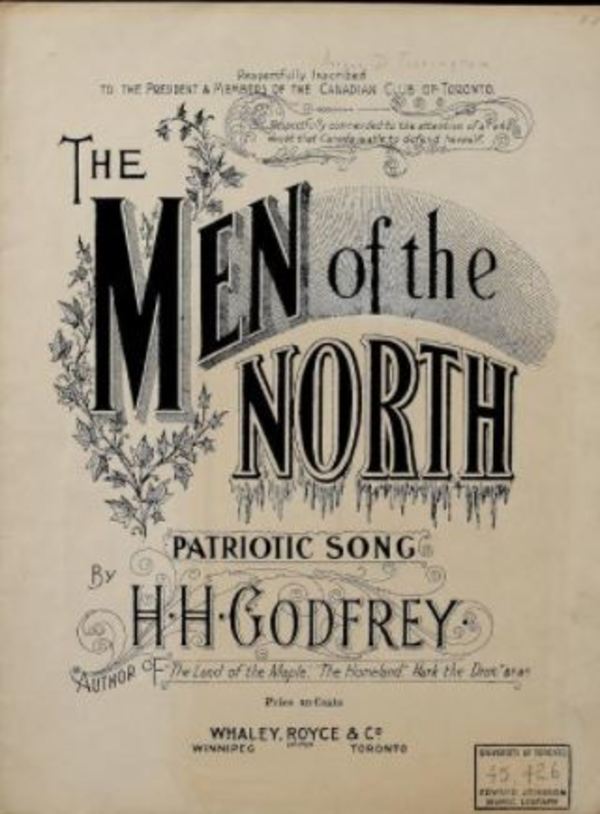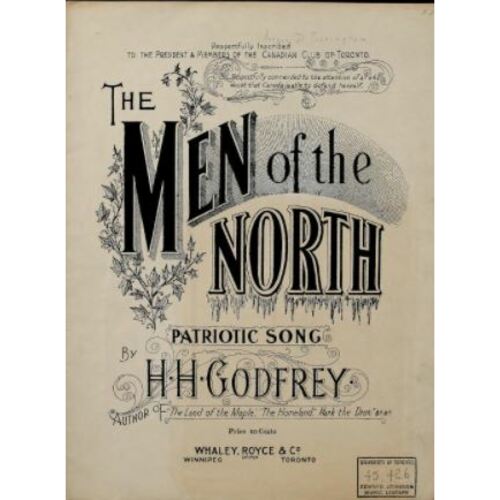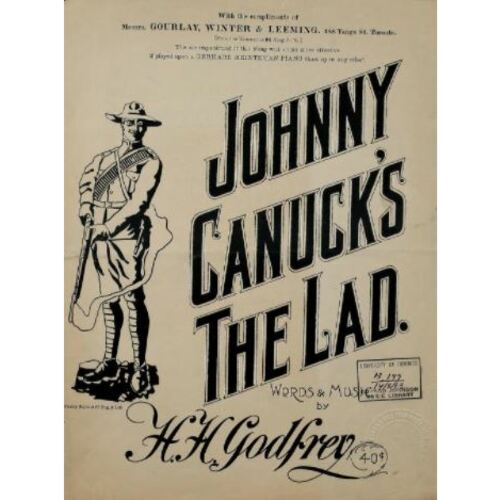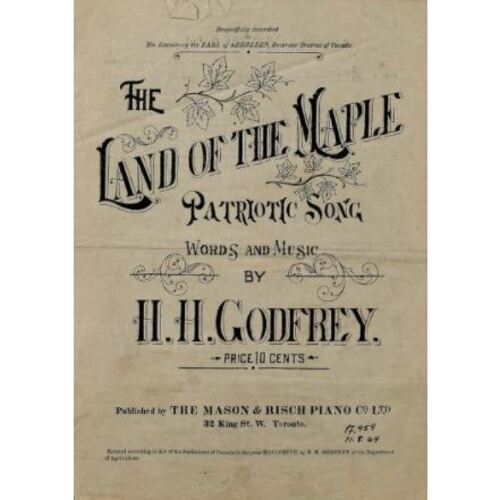
Source: Link
GODFREY, HENRY HERBERT, musician, businessman, and composer; b. 9 Dec. 1858 in Plymouth, England, son of Annie deCarteret, a servant, who later married Thomas Godfrey; m. 15 Nov. 1884 Annie Storey of Ottawa, and they had three daughters and one son; d. 18 or 19 Jan. 1908 in Westmount, Que.
Henry Herbert Godfrey’s training in music was informal and included some instruction from his stepfather, who was a church organist. Reportedly possessed of a natural talent as pianist, singer, and entertainer, he spent much of his youth on Guernsey but left home at an early age to join a vaudeville troupe in England. In 1874 he rejoined his family, which had immigrated to Montreal. He worked in a piano factory, served as organist at St Stephen’s (St Edward’s) Church, and formed a band which played in vaudeville shows.
Godfrey’s business career occurred at a time when there was a flourishing industry in the manufacturing of pianos and organs and the publishing of sheet music; eventually he became well known in business and music circles. He moved to Ottawa in 1883 as a piano salesman for the company of Abraham* and Samuel Nordheimer. In 1888 he located in Toronto to join a rival firm, Mason and Risch. While employed there he produced A souvenir of musical Toronto for 1897 and reissued it the following year as Musical Toronto. These works gave biographical sketches of musicians, listed the city’s musical institutions, and included promotional material for Mason and Risch. Later he served as manager of another piano company, Gourlay, Winter, and Leeming.
Music companies in the late 19th century thrived on an escalating demand for parlour pieces and patriotic songs, both of which served as vehicles for Godfrey’s success as a composer. The Nordheimer company published some 15 of his dances and marches for student pianists. The University of Toronto songbook committee awarded him a gold medal for his entry in a competition in 1898. His winning piece, “Toronto, or the pride of the north,” eventually appeared in several other college songbooks under different titles. However, it was patriotic songs, most of them set to his own texts, that ultimately brought him national renown. “The land of the maple” (1897), which appeared in both English and French versions, sold over 100,000 copies and was said, in his obituary, to rival Alexander Muir’s “The maple leaf for ever” (1867) in popularity. It is not surprising that Godfrey’s words “the Rose and the Thistle, the Shamrock and ‘Lis’ all bloom in one garden neath the maple tree” had greater appeal for the country’s French-speaking population than did Muir’s celebration of British victories and accomplishments. “The men of the north” (1897) was also a tremendous success. Its lyrics extolled the virtues of strength, freedom, and national pride, attributes associated with the British empire and the myth surrounding northern races. A generation of schoolchildren sang Godfrey’s songs for royal visits, Empire days, and other special occasions. The writer of his obituary declared that his songs, several of which were composed during the South African War, breathed “fervent patriotism.” Eighteen of his published songs were compiled in an album called Canadian patriotic songs and melodies (1902). It appears that none of his songs have ever been recorded.
In 1903 Godfrey returned to Montreal, where he managed C. W. Lindsay and Company, piano dealers. On the evening of 18 Jan. 1908 he went to bed “in his usual health” and was found dead the following morning. At the time of his death he had “only just completed” editing a collection of Canadian national songs for publication in Edinburgh as part of a series of international patriotic songs.
Genealogical information concerning Henry Herbert Godfrey, including an undated typescript entitled “Some family background” prepared by his daughter Ethel Godfrey Main, is in the possession of a granddaughter, Mrs Frederick Morton of Wakefield, Que. A copy of Mrs Main’s sketch is in Godfrey’s file at the National Library of Canada, Music Div. (Ottawa).
The 1897 edition of A souvenir of musical Toronto, compiled by Godfrey (Toronto, 1897), is available at the National Library and the HPL; the latter’s copy has also been made available on microfiche by the CIHM (ser. no.13872). The only known copy of the 1897–98 edition, entitled Musical Toronto and published in 1898, is located at the New York Public Library. Some of Godfrey’s songs, including “The land of the maple” and “The men of the north,” appear in the revised edition of The University of Toronto song book, ed. J. E. Jones (Toronto, 1918).
NA, MG 29, D77. Gazette (Montreal), 20 Jan. 1908: 14. Montreal Daily Star, 20 Jan. 1908: 1. Encyclopedia of music in Canada (Kallmann et al.), 381, 729–30. M. F. Mallon, “Musical Toronto in the eighteen nineties,” York Pioneer (Toronto), 73 (1978), no.2: 1–9. E. B. Moogk, Roll back the years: history of Canadian recorded sound and its legacy, genesis to 1930 (Ottawa, 1975). Frances Roback, “Advertising Canadian pianos and organs, 1850–1914,” Material Hist. Bull. (Ottawa), 20 (1984): 31–44.
Cite This Article
J. Paul Green, “GODFREY, HENRY HERBERT,” in Dictionary of Canadian Biography, vol. 13, University of Toronto/Université Laval, 2003–, accessed December 30, 2025, https://www.biographi.ca/en/bio/godfrey_henry_herbert_13E.html.
The citation above shows the format for footnotes and endnotes according to the Chicago manual of style (16th edition). Information to be used in other citation formats:
| Permalink: | https://www.biographi.ca/en/bio/godfrey_henry_herbert_13E.html |
| Author of Article: | J. Paul Green |
| Title of Article: | GODFREY, HENRY HERBERT |
| Publication Name: | Dictionary of Canadian Biography, vol. 13 |
| Publisher: | University of Toronto/Université Laval |
| Year of publication: | 1994 |
| Year of revision: | 1994 |
| Access Date: | December 30, 2025 |





